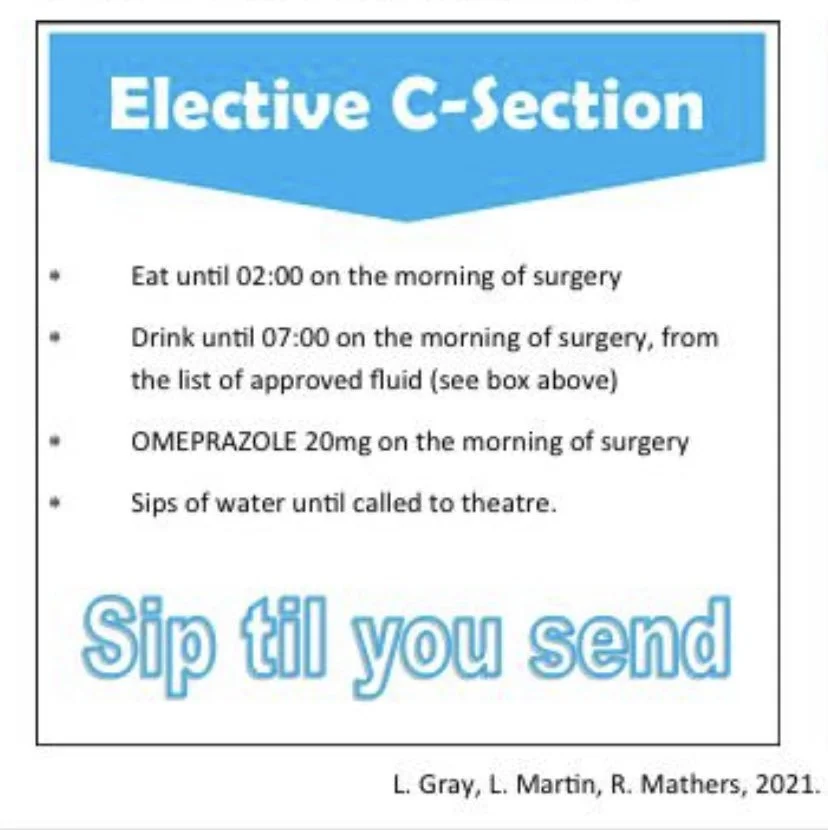Sip Til Send - Making Cesareans Safer
This is important information to share - even if a planned cesarean is not in your future. At some point you or a family member will likely need a procedure that involves restricted fasting for several hours - thankfully a new initiative is spreading in the UK (and hopefully coming soon to a hospital near you) so mentally file this info away for future use.
As I’m writing this Texas is in a heatwave - not unusual for August in Texas but most of Europe is also struggling with high temps. If you’re having a planned cesarean, sitting in hospital for hours in badly ventilated rooms combined with anxiety can take away some of the excitement of that day - when you get to meet your baby. Restricting fluids is harming women. (Some US hospitals are still restricting food/water during labor - another harmful practice). Some European hospitals still allow a light diet even with an epidural.
For many years it was accepted that fasting over longer periods before surgery was necessary. Like many areas of obstetric care this policy has gone unchallenged. It was a policy something nobody questioned until recently. The fear is that having fluid or food in the stomach could increase the risk of aspiration and cause a serious infection.
According to Anesthetist Dr Matthew Checketts the current guidelines of restricting liquids is not evidence based practice. Dr Checkett surveyed hospital patients and found that on average patients were being fasted for an average of 7 hours - but as high as 20 hrs (especially if their surgery was cancelled).
As I was researching this new approach some women were left with no liquids for over 12 hrs (even with Gestational Diabetes) and feeling anxious and miserable.
I had a planned section. I had GD (diet controlled) and had to fast I think no food after 8pm and no liquid after midnight. And to present myself in hospital for 8am. Which I dutifully did.
Between emergencies and this that and the other I was not sent to theatre till 5pm all the while nil by mouth. I was so dehydrated the anesthesiologist couldn’t get a line on the back of my hand and I had to get it in the elbow which was bloody uncomfortable till it came out. Hard to hold a baby to breastfeed with it and all the other wires.
My friend whose a Midwife elsewhere say I should ask for them to hang a bag of fluid for me, but I didn’t as every time they stuck their head in it was “your up soon” or “won’t be long now” so I felt it was pointless.
We were sat waiting on a particularly sunny day In a room where the window was literally sealed shut with tape and it couldn’t be opened.
International guidelines currently recommend no liquids up to 2 hrs before surgery. But delays happen and non emergency surgeries get postponed or cancelled leaving mom’s distressed and dehydrated.
According to Dr Checketts, liquids empty from the stomach in minutes and it reduces stomach acid volume as well as the acidity (making your surgery safer). Fluid restrictions does not make anesthesia safer - in fact it can increase complications especially for women preparing for a planned cesarean birth.
“It’s a complete fallacy that it’s dangerous. We have been harming our patients for the past 70 years” - Dr Matthew Checketts
The protocol developed by Dr Checketts advises that women can have a hot drink in the morning if they want to - (including up to 15mls of milk) and after that 1 cup of clear fluids to sip on per hour (160mls) while they wait to be sent to the operating room. Water, diluted juice with no bits are suggested options (Mr Freeze ice lollies or flavored ice are also safe options).
Hospital audits are continuing and demonstrate the following benefits - with no increased risks.
Improved experience while waiting.
Helps to keep blood pressure normal.
Lower incidences of nausea and vomiting after general anesthesia.
Makes it easier to cannulate (the needle attached to an IV drip).
Optimizes wound healing.
Supports breastfeeding.
Have you experienced fluid fasting in the past? Is this an approach you would prefer?
For those seeking advice on implementing this policy, you can contact Dr Checketts on Matthew.Checketts@nhs.scot


